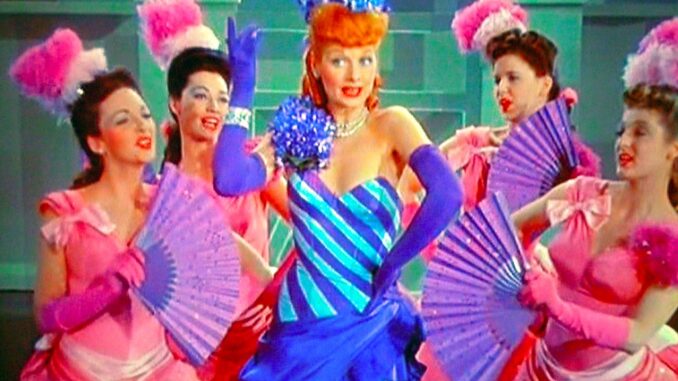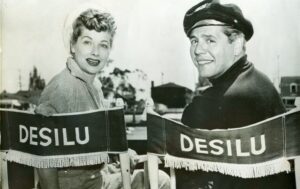
When Lucille Ball agreed to star in I Love Lucy, she made a decision that would change television forever — but not without personal financial sacrifice. Today, we know her as a groundbreaking comedian and one of the first true TV icons, but few realize the lengths she went to in order to bring I Love Lucy to life. While she could have chosen a more financially beneficial path, Lucille Ball prioritized her creative vision over her bank account. Here’s a closer look at why she took a financial hit for I Love Lucy and how this iconic show redefined her career and the television landscape.
The Bold Choice That Changed TV History
Lucille Ball’s decision to move forward with I Love Lucy wasn’t easy or financially straightforward. She faced significant challenges but ultimately chose to bet on her talent, her marriage, and the power of television. This article delves into why she made this choice, exploring how the sacrifice paid off in ways even she couldn’t predict.
The Context of Hollywood in the 1950s

In the early 1950s, television was in its infancy, with Hollywood studios primarily focusing on films. For many established stars like Lucille Ball, transitioning to TV was seen as a step down from the glamour and prestige of the big screen. However, Ball saw an opportunity to reach audiences directly in their homes, but this shift came with financial and professional risks.
Lucille Ball’s Rising Star in Film
Before I Love Lucy, Lucille Ball had carved out a respectable career in Hollywood. She starred in numerous films, establishing herself as a gifted comedic actress. However, she wasn’t quite a household name yet. In Hollywood, many saw her as a talented actress who hadn’t reached her full potential. Moving to TV gave her a chance to do just that, even if it meant walking away from the movie industry.
The Turning Point — CBS’s Proposal for ‘I Love Lucy’
CBS approached Ball with the concept of a sitcom that could bring her humor to television audiences. They wanted her comedic style, but there was a catch — CBS wasn’t willing to pay the same rates that movie studios would. The financial implications were clear; Ball wouldn’t be making her usual film salary. Despite the pay cut, she saw the project’s potential.
Lucille Ball and Desi Arnaz’s Partnership
One of the biggest reasons Ball agreed to the project was her relationship with her husband, Desi Arnaz. She believed that working with him on-screen could strengthen their marriage. However, CBS initially resisted casting Arnaz, fearing audiences wouldn’t respond well to an interracial couple. Ball stood her ground, convincing the network to take a chance on their on-screen dynamic.
Why CBS Hesitated on Casting Desi Arnaz
At the time, it was unusual for networks to portray interracial couples, and Desi’s Cuban heritage was a risk CBS wasn’t initially prepared to take. However, Ball knew that her comedic timing and chemistry with Arnaz would bring authenticity and humor that couldn’t be replicated with anyone else.
Taking Financial Control Through Desilu Productions
Realizing that the network wouldn’t fully support her creative vision, Ball and Arnaz founded Desilu Productions. By producing I Love Lucy themselves, they gained control over creative and financial decisions. This choice was groundbreaking, but it came at a high cost. They were responsible for all production expenses, meaning that financial loss was likely — especially if the show didn’t succeed.
The Importance of Owning the Show’s Rights

In addition to producing the show, Ball and Arnaz negotiated to retain ownership of the episodes. This was almost unheard of at the time and allowed Desilu Productions to profit from reruns, something that would prove highly profitable in later years. However, it required them to invest heavily up front.
Lucille Ball’s Vision for ‘I Love Lucy’
Ball was clear on her vision for the show. She wanted I Love Lucy to be more than just slapstick comedy; she wanted to create memorable storylines and relatable characters. This commitment drove her to prioritize quality over personal financial gain.
Defining Sitcom Standards with Multi-Camera Filming
Lucille Ball also took creative risks, including pioneering the multi-camera setup, which is now a staple of sitcom filming. This technique allowed for higher-quality production but came with higher costs, further impacting Ball and Arnaz’s finances.
The Financial Struggles of Producing a TV Show
Producing a television show on their own was no easy feat, and Desilu Productions encountered financial struggles early on. Ball and Arnaz often used their own savings to cover production costs. They had to finance many aspects that the network wouldn’t cover, adding a substantial financial burden.
The Initial Reception and Risk of Failure
When I Love Lucy first aired, there was no guarantee of success. Ratings were uncertain, and CBS wasn’t fully confident in the show’s appeal. If it hadn’t succeeded, Ball and Arnaz would have faced significant financial loss, which made the early days of production a nerve-wracking time.
How ‘I Love Lucy’ Became a Cultural Phenomenon
Despite the initial struggles, I Love Lucy quickly gained popularity. Audiences loved Ball’s portrayal of Lucy Ricardo, a mischievous housewife with a knack for trouble. The show’s relatable humor resonated with viewers across the country, proving Ball’s instincts right.
The Legacy of ‘I Love Lucy’
By taking this financial risk, Lucille Ball didn’t just make history; she helped define what television could become. I Love Lucy opened doors for future shows and inspired countless comedians, actors, and producers. The show’s influence on comedy, storytelling, and television production is still felt today.
The Financial Payoff Came Later
Although Ball initially took a financial hit, the success of I Love Lucy eventually turned her sacrifice into substantial wealth. Desilu Productions went on to produce other hit shows, making Ball and Arnaz influential figures in Hollywood. What began as a financial risk eventually became one of the most lucrative and iconic ventures in TV history.
Lucille Ball’s Enduring Influence in Entertainment
Ball’s decision to prioritize artistic integrity over financial security set her apart from other Hollywood stars of her time. Her career became a blueprint for aspiring actors who wanted to blend creativity with business savvy, leaving a lasting legacy on the entertainment industry.
Conclusion
Lucille Ball’s choice to star in I Love Lucy wasn’t just a career move; it was a gamble that redefined television and comedy. By agreeing to a financial loss and betting on her partnership with Desi Arnaz, she laid the groundwork for television as we know it. Her commitment to creativity, innovation, and authenticity made I Love Lucy a show that continues to resonate with audiences worldwide. While the financial rewards took time to materialize, her pioneering spirit proved priceless, making her one of the most respected figures in entertainment history.